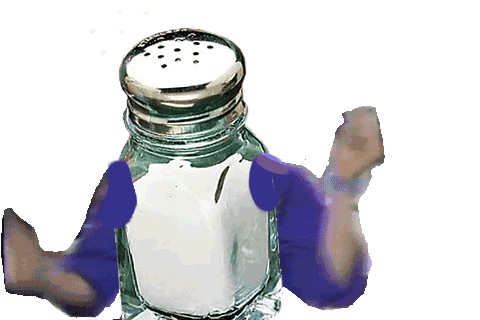Hello there forum users, and welcome, to “The Guide to Salt”.
INDEX
- Salt by Definition
- Results of Salt
- Common Triggers and How it Leads to Salt
- How to Contain Salt
Chapter 1: Salt by Definition
Now you may be thinking to yourself, “I sure do love to put salt on food!”
No, no you innocent child. You are thinking of the wrong type of Salt!
This guide is not about NaCl (“a white crystalline substance that gives seawater its characteristic taste and is used for seasoning or preserving food.”) but about the emotion usually associated with bitterness, anger, and frustration.
According to UrbanDictionary.com, Salt is: “A word originating in Philadelphia generally meaning that you just got played, or are looking stupid, either because of something you did, or something that was done to you.”
Are you starting to understand? When used online, the word Salt can be described as someone who is angry, bitter, or upset. The word is commonly directed towards others, and is rarely used in first person. One common phrase is: “Dude, don’t be salty.”
Chapter 2: Results of Salt
So now you know what it means when someone is “salty”, but how does a person respond in this situation? Many times, a person experiencing salt will become offended easily (also known as triggered). They may rant online using social media, creating long pointless threads or messages people do not care enough to read.They may also directly attack the user who caused them to experience “salt”, using name calling and attempts to put the shame on them. You may now be able to recognize a person experiencing this simply by reading others behaviors.
Chapter 3: Common Triggers and How it Leads to Salt
Now, I used the word “trigger” earlier. A “trigger” is a word or comment that causes a person to experience an emotion (usually a negative one). If someone says, “Hey he is triggered”, the person he is referring to has been upset by something recently mentioned. You may be thinking: So how do people get triggered? Good question! Different people are upset by different things. Most commonly, people are triggered by: opinions opposing their own, insults, people using common sense towards their irrational comments, and those more popular than them. It is almost impossible to avoid using a trigger word, since this is the internet, and everything is taking literally. If you do not wish to offend someone, I suggest not saying anything.
Chapter 4: How to Contain Salt
We have discussed what Salt is, and how it is created, but how do you stop or contain the Salt?
For example, Jimmy calls your new shirt ugly. But you love that shirt, and now you are salty. What should you do? Nothing. Try being the better person, and ignoring Jimmy. Why should Jimmy’s opinion effect your own? Containing your Salt is being Mature, both which are good to practice. DO NOT: Respond to someones negatives comments with a joke or insult. This can lead to what is known as a “rant” (mentioned in Chapter 2).
Now you know how to identify and handle Salt. Put this knowledge to good use!
Feel free to forward and send this to anyone who might need help understanding.
All content in this guide have been created/published by @profbonkars.

